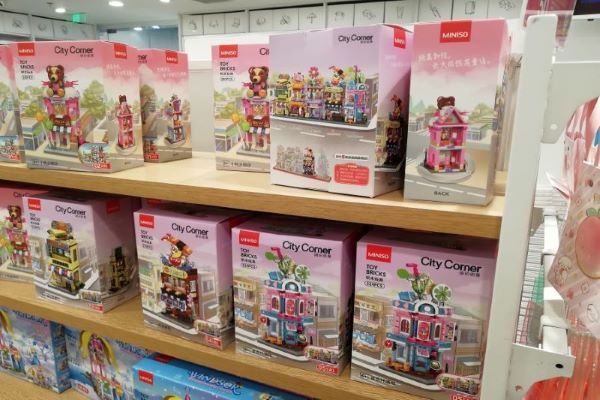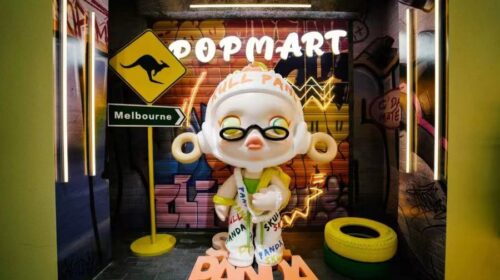Impulse-Buying Specialist Miniso Embarks on Major Toy Play

Mini-store operator plans big move into pricier toys and collectibles with launch of Top Toy chain
Key points:
- Miniso is moving aggressively into specialty toy shops with its new Top Toy chain
- Strong investor interest in toy retailing is reflected by the high valuation for rival toy chain Pop Mart
By Doug Young
China’s favorite impulse buying chain Miniso Group Holding Ltd. (NYSE: MNSO) is making a major strategic shift by moving aggressively into the toy business. The move does seem to make sense for a chain like Miniso, as some of the most-impulsive buying comes from parents out with kids and also from young people in pursuit of the latest collectible toys.
Miniso disclosed its toy aspirations in a business update last week, which also included discussion of its ongoing global push. The company looks quite interesting from a retail perspective due to its positioning as an impulse-buying specialist operating a chain of small, colorful stores selling mostly items under $10 in busy shopping districts.
Miniso chose to play up its rapid rate of new store openings in the latest update, though the toy play looks more interesting and newer. A recent visit to one of its shops in Beijing shows that toys are indeed an increasingly important part of its business mix, supplementing all the other various knick-knacks it sells like office supplies, makeup and other accessories.
“The toy category became another new growth engine for Miniso,” the company said in the update. “Toy sales in the China market nearly doubled compared to last year, and the brand is to duplicate that success in overseas markets.”
In a nod to the growing importance of toys, Miniso said it has developed a separate in-house brand of toys and stores under the Top Toy name. It said the line “serves higher end collectibles and art toy markets,” with some 2,000 products currently carrying the name.
And unlike most of its goods that typically cost $10 or less, Top Toy products can cost anywhere from $10 to as much as $1,000. That’s hardly an impulse buy for most of us, though it’s possible people might consider forking out such funds if Miniso can create “must have” collectibles that capture the public’s imagination.
Acknowledging that Top Toy may be chasing a slightly different market than traditional Miniso shops, the company has launched a differently branded Top Toy chain to carry the products. That chain has opened 25 stores in China since its launch at the end of last year, and will make its global debut in the second half of this year, Miniso said.
In going after the collectible toy market, Miniso appears to be chasing Pop Mart International, another toy seller that has found particular success with toy vending machines in China. Both Miniso and Pop Mart made IPOs toward the end of last year when China was largely emerging from its pandemic, each chasing a similar group of less-serious buyers who are out more for leisure rather than specifically to buy something.
That market in China is particularly fertile ground due to the country’s growing middle class, especially in larger cities, where people consider spending $10 on a movie ticket, a couple of Starbucks coffees, or a cute collectible toy during an evening out as a form of entertainment much the way people do in the West.
Highly Valued
Both Pop Mart and Miniso look relatively pricey when compared with Western peers, probably due to the China premium and also their relatively unique position as impulse retailers selling relatively high-margin products. Miniso lost money during the pandemic, but has emerged back into profitability with China’s economic rebound.
Based on forecast earnings for its current fiscal year, the company trades at a relatively high price-to-earnings (PE) ratio of 88, though the number comes down to 35 based on earnings forecasts for the next year. Pop Mart trades at an even higher 165, though we should note that figure is based on its earnings for 2020.
All of those figures are quite high compared to more mature Western companies, with U.S. leading retailer Walmart and top toymaker Mattel now trading at PEs of 33 based on 2020 earnings.
In terms of price-to-sales (P/S), Miniso trades at a relatively normal-looking ratio of 5, reflecting its relatively large revenue. By comparison, Pop Mart trades at a quite inflated P/S ratio of 34, which seems to indicate that investors are very bullish on the company despite its relatively modest sales.
That bullishness is also reflected in Pop Mart’s stock price, which has roughly doubled since the company listed last December. By comparison, Miniso’s stock nearly doubled from its IPO price at one point in February, but later gave back most of those gains and currently trades around 10% higher than its listing price.
All that would seem to indicate investors quite like the toy concept over more general retailing, especially the market for collectibles that can carry very high margins if companies can develop “must-have” toys coveted by teens and adults.
From a broader perspective, Miniso – whose shops look suspiciously like a highly-scaled down version of popular Japanese retailer Muji – is a bit more advanced than Pop Mart in terms of total store count and global expansion. Miniso now operates in 94 markets outside China with 4,587 stores at the end of May.
The total store count is actually up just modestly from the 4,514 stores at the end of last year, while the global market count is up quite a bit from 80 markets Miniso was in at the time of its IPO last October. In particular, Miniso is making a strong move into Europe, with many of its recent new store openings concentrated in the likes of Italy and France. Its business model is relatively scalable, as it often works with other frachisee-style partnerships in both China and abroad.
At the end of the day, Miniso’s move into toys looks relatively shrewd due to the big potential for such products, as reflected by Pop Mart’s big success in the area. But toy retailing is also notoriously difficult due to the e-commerce challenge and its reliance on fads, which is why there are few major specialty toy retailers still in business. Accordingly, Miniso should take its drive into toys slowly, though it does seem to be having some early success.
To subscribe to Bamboo Works weekly newsletter, click here




